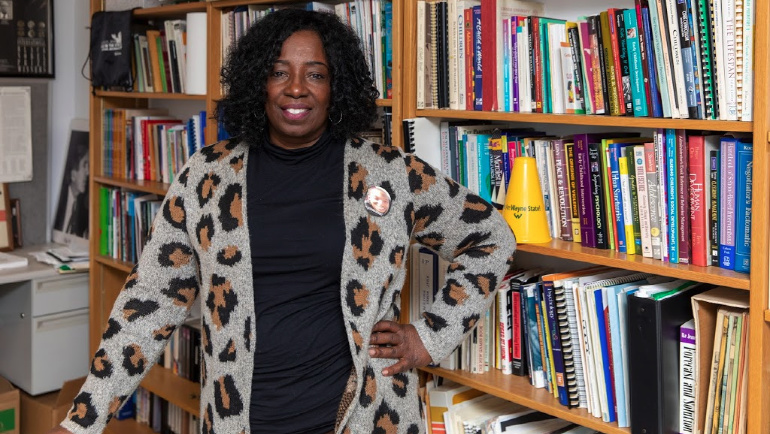
Inside her office on the second floor of Wayne State University’s Faculty Administration Building, Barbara L. Jones dabs at the tears streaking down her face and inhales, pausing to reflect on a visitor’s question about the toll that personal tragedy can take on professional drive.
Jones, the community dispute resolution specialist and faculty instructor for Wayne State’s Center for Peace and Conflict Studies, has spent a good chunk of her professional career preaching to youth and adults alike about the futility of violence and the value of peaceful problem-solving. From teaching at the center to organizing as the program director for its annual Ralph Bunche Summer Institute, in addition to her year-round collaboration with activist organizations like the Detroit Justice Center, Jones has become a highly visible and critical grassroots liaison between WSU and local efforts to promote community stability and secure social justice for rank-and-file Detroiters.
She loves what she does, she explains, and has since she started at the center in 2011. She has dedicated her life to it, in fact. “But there are also times every day,” Jones con- fesses as the tears trickle, “when I say I just want to quit this work.”
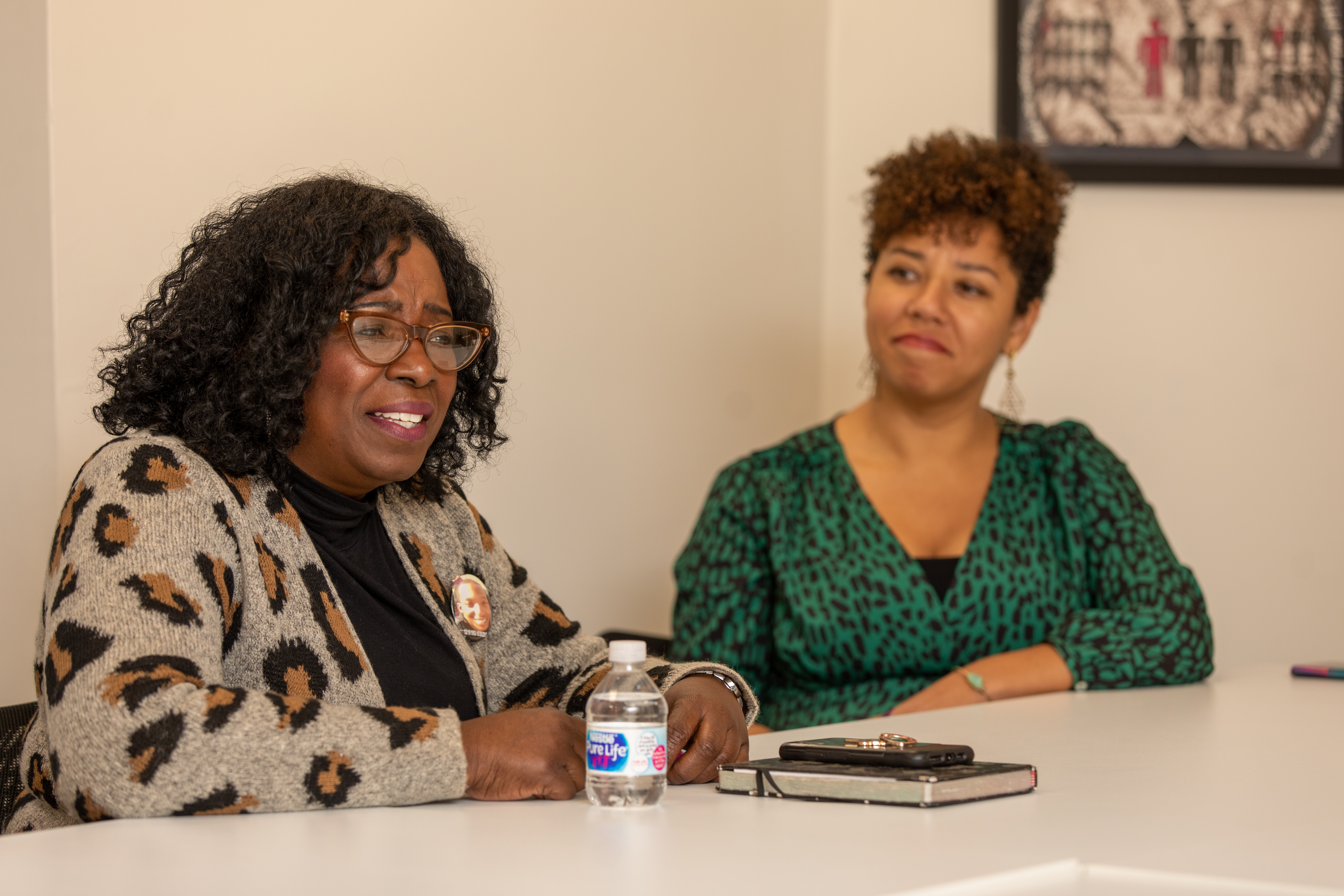
In her head, she knows she can’t give up. She knows how important her work is, not only to the university, but also to the local communities where Jones’ efforts have helped stem conflicts and inspired a generation of young Detroiters seeking solutions to neighborhood violence.
But just as that bloodshed has traumatized many of the lives her work has touched, so has it scarred Jones’s own life. And it has of- ten forced her to question her own purpose.
After all, Jones sometimes wonders, how can she continue to devote so much of her time, energy and resources to stemming violence in the lives of others when she couldn’t stop that violence from swallowing the life of her own child?
Three years ago, in 2017, Jones’ only son, 24-year-old Conte Emanuel Smith-El, was brutally slain during a robbery in Colorado Springs, Colorado, where he had gone to escape violence in Detroit. Two men were ultimately arrested and imprisoned for the murder, but the incident continues to haunt Jones — who a few years ago established a scholarship at Wayne State in her son’s name — so much that she questions herself and her work on a near-daily basis.
“I really do quit every day,” says Jones, still pressing damp tissue against her face. “But then I realize that I’m not doing this just for me, that I have to find a way to continue on because this is about so much more than my own life. It’s about helping to save the lives of all of our young people...But it still hurts so much to know that, for everything I’ve tried to teach about nonviolence and solving problems peacefully, none of it could save my own son.”
Pushing back against bullying
For Jones, part of her ongoing devastation over her son’s death stems from the fact that she had spent years trying to shield Smith- El, who suffered cognitive impairments, from bullies and bloodshed. In fact, it was her efforts to protect her son that helped transition Jones, a former senior ad salesperson for local cable and radio, into conflict resolution work in the first place.
“When he was in high school, during his freshman year, my son was attacked inside his school,” says Jones. “A group of young men who didn’t attend the school came in and were trying to recruit people into their gang. They targeted him and a classmate, but neither of them wanted to join, so they threatened them. The classmate got away. My son didn’t. They pistol whipped him.”
That attack changed her life.
“That’s where my frustration, my anger, my purpose and the work that I’m doing now really started,”
Jones says. “I had already started my master’s program here at Wayne State. And I knew that’s what I wanted to do with my degree; I wanted to not only just help my son, but to teach my son and others how to use their voices to avoid conflict.”
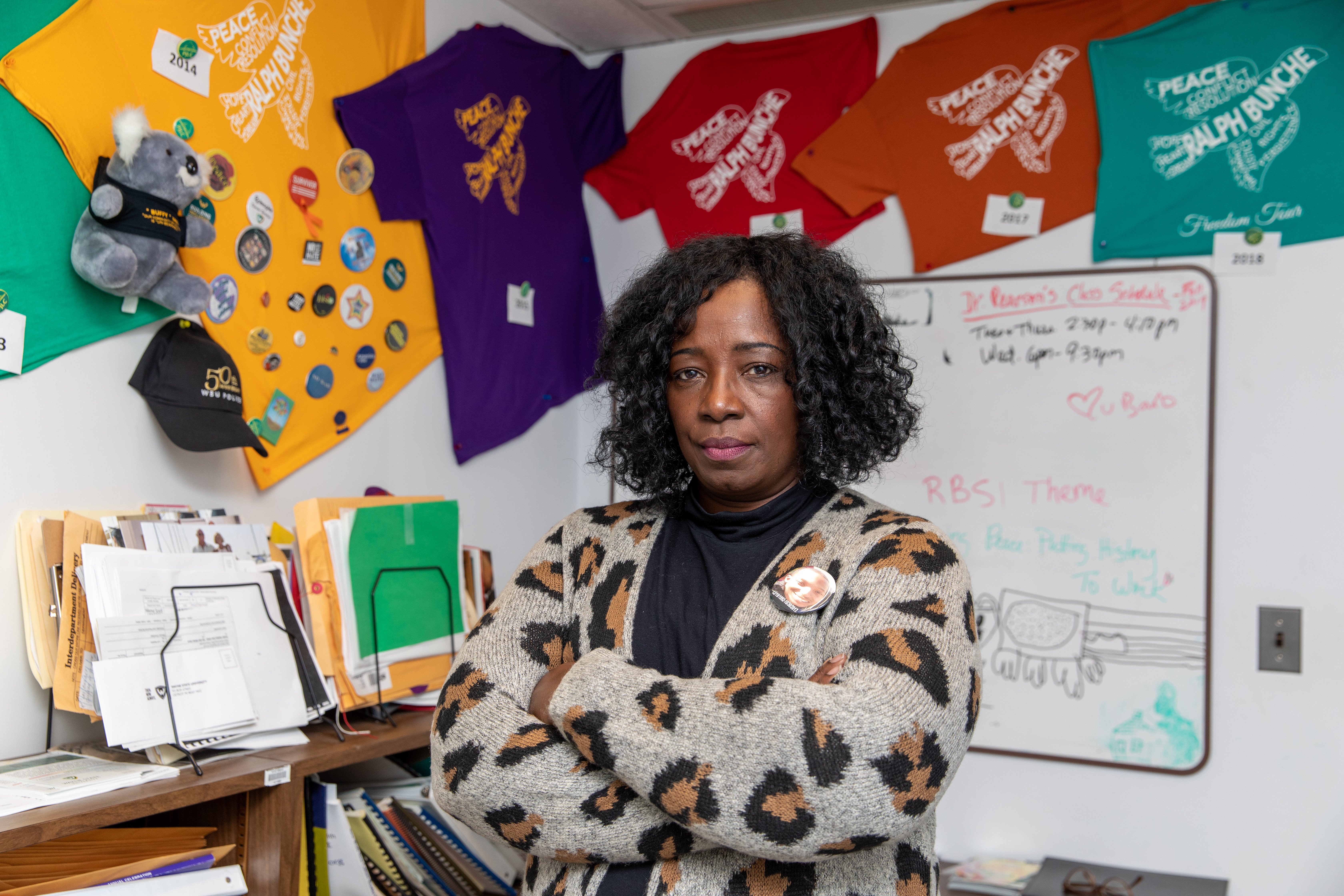
In 2013, a year after receiving her master’s and beginning her graduate certificate studies in peace and security studies, both from Wayne State, Jones stumbled across the teaching tool that would jump-start her work. Serving then as a student assistant in the Center for Peace and Conflict Studies, Jones was rummaging through the center’s archives when she ran across information about a dormant summer program that, before it lost funding, had been crafted to help youth hone conflict resolution skills.
Immediately, Jones knew that, if revived, the Ralph Bunche Summer Institute — named for a famed civil-rights activist and confidante to Dr. Martin Luther King Jr. — would be an ideal vehicle for her efforts.
“I’m going through all this stuff, looking at the curriculum, looking at the programming,” she recalls. “I look at it, and I’m like, ‘My god, where was this type of program when my son was in high school and in middle school?’”
Jones went to center director Fred Pearson, Ph.D., and asked if she could be given a chance to revitalize the summer program.
“I said, ‘If you let me take on this program, I’ll find money,’” she says. “I knew that if I found the money, I’d want to take full ownership of it — not to change the integrity of the program, but to see how I could modernize it after it had been dormant for several years.”
After a few discussions, Jones eventually won permission to take on the program, along with responsibility for funding it. Despite the Summer Institute having been inactive for more than a decade, Jones never doubted her ability to resurrect it.
“Remember, my job in media was PR, marketing and media promotions — so I knew how to ask for money,” says Jones with a chuckle. “I told them that, if they let me, I’d do it my way. I had relationships already established in the community and knew they’d help because this is a phenomenal program.”
Giving new life to an old initiative
With backing from WSU partnerships with institutions such as the Damon J. Keith Center for Civil Rights, the Detroit Youth Violence Prevention Initiative, city government and community organizations, as well as from groups such as the Detroit Rotary Club, Jones was able to raise enough money to restart the program in the summer of 2013. “I was able to start small, get it off the ground, make it more focused,” says Jones. “It wanted to make sure it wasn’t so ‘academic-y’ for these young people, because we needed their engagement. I explained to the university that you’ve got to meet them where they are. And trust me, I know: I’m a mama. I’m not everybody’s mama, but I try to be sometimes.”
For the next six years straight, Jones toiled to grow the program, increasing funding as well as student participation. The number of students involved in the institute increased annually, going from 25 in 2013 to as many as 75 students in 2018. And with each passing year, Jones’ faith in her work grew as well.
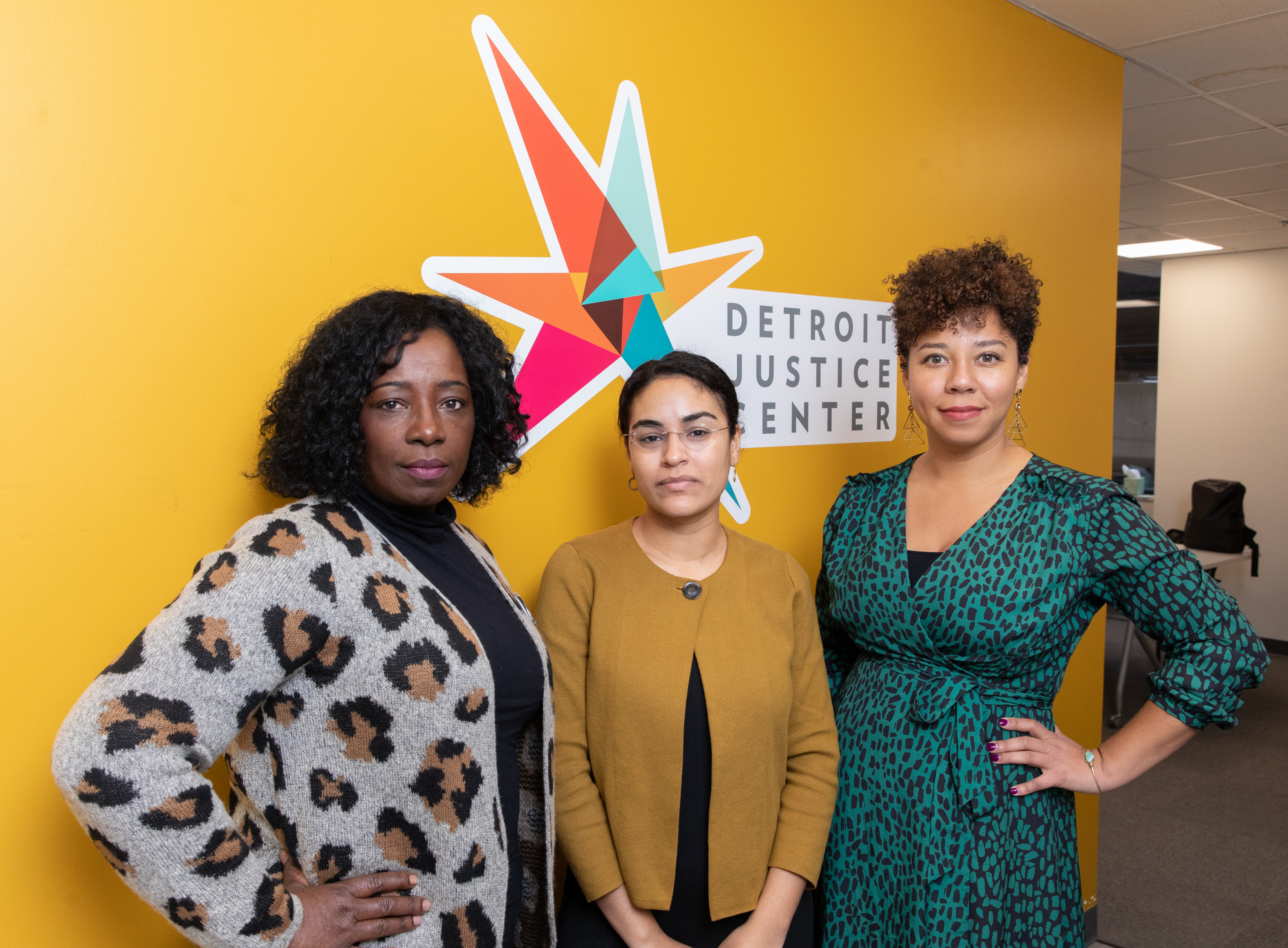
“Barbara is such a builder,” says attorney Amanda Alexander, founding executive director of the Detroit Justice Center, who has partnered with Jones to help promote social justice initiatives citywide. “And she’s someone who sees that [anti-violence work] is what needs to happen. She has helped to build this pipeline of young people who are equipped with skills when it comes to dispute resolution, conflict resolution, who can be ambassadors for healing and peace. This is what people need in order to heal. Barbara doesn’t wish or what-if. She builds — again and again.”
Jones confesses that, despite her fundraising skills honed in media ad sales, the effort grows exponentially tougher each year. “We did wonderfully,” she says. “But of course, the more successful a program is, the more pressure and higher expectations you have on those existing and valuable relationships because you need to grow it, to make it more sustainable, and that involves more money, more community partnerships, more proving that this program works. But I never doubted that we would keep going and growing.”
But five years into her work as program director of the institute, Jones endured the tragedy that would rock her faith and the very foundation of her life.
Growth in the midst of grief
On Oct. 30, 2017, Smith-El was working alone inside a store in Colorado Springs — the city he’d moved to with his sister shortly after graduating high school in Detroit — when two gunmen burst in carrying a semiautomatic rifle. Smith-El tried to escape but was caught, tied up and tortured for hours. As he begged for his life, Smith-El was fatally shot seven times with an AR 15 semi-automatic rifle.
Somehow, the following year, Jones was able to organize the Summer Institute one more time, even as she flew to and from Colorado Springs to deal with her son’s death and support her only daughter, who suffered the complicated effects of losing her only sibling as well as enduring the sub- sequent court cases for the young men who were directly responsible in his homicide.
In 2018, she also set up the Conte Emanuel Smith-El Annual Scholarship “to recognize scholastic achievement, to encourage continued progress, and to provide assistance to students in financing their education in the College of Liberal Arts and Sciences,” according to its official description. Eligible students must be full- or part-time students enrolled in Wayne State’s College of Liberal Arts and Sciences and are encouraged to seek being a co-major in the Center for Peace and Conflict Studies or a graduate certificate in disabilities.
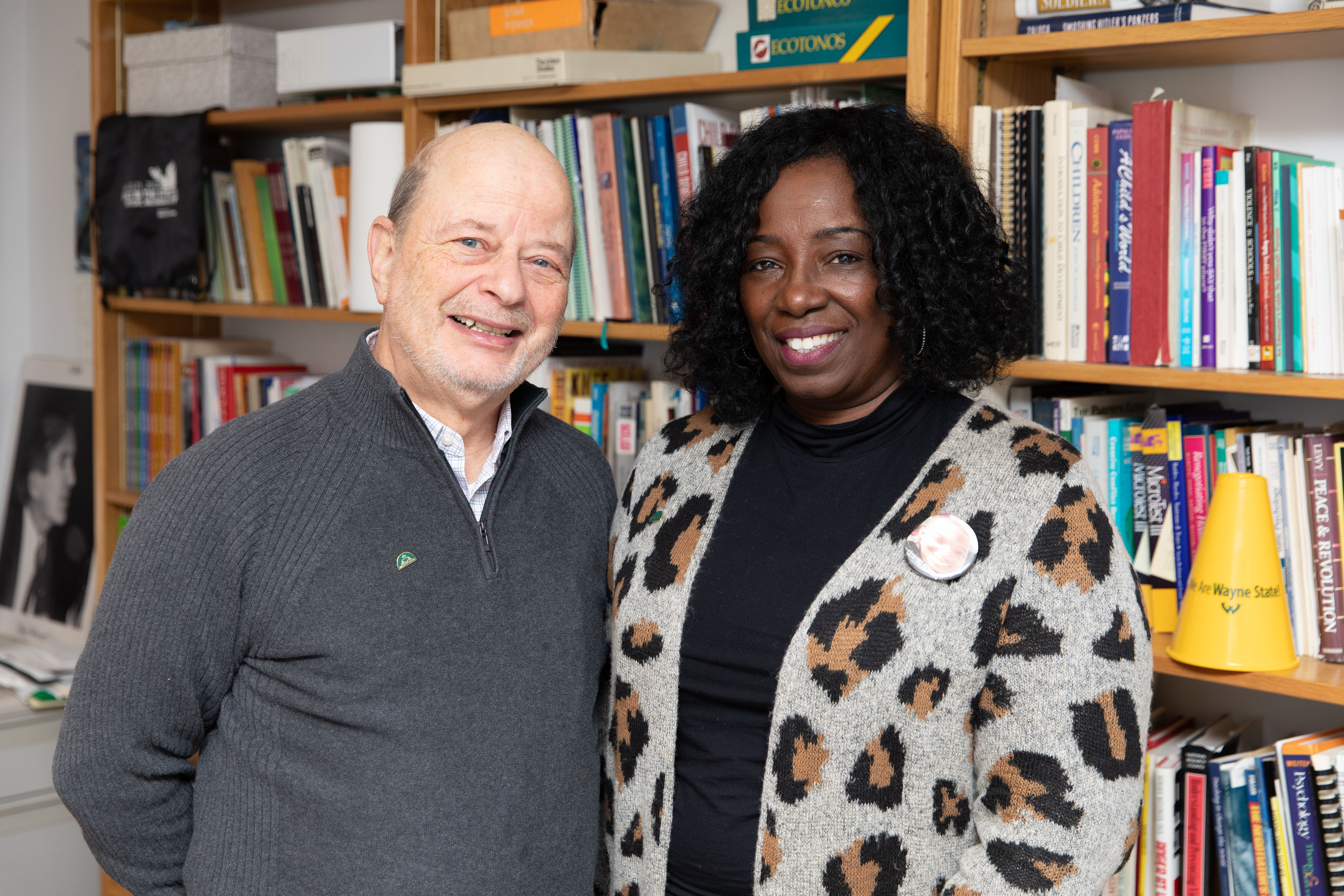
Still, the tragedy has taken a serious toll on Jones and her work. Last year, she says, the mourning and the burden of travel became too great and, for the first time since she started the institute, Jones had to take a summer off.
Nevertheless, Jones’ work continues, not just within the community but within herself as well. A staunch advocate of restorative justice — which seeks the rehabilitation of offenders in the criminal justice system through reconciliation with victims and affected communities — Jones says she has determined that she will, despite her grief, put into practice the very same principles she so ardently preaches: Jones is working toward establishing a dialogue between herself and one of the young men convicted of killing her child.
“I have to do restorative justice in my own life,” she says. “I can’t continue to only learn and teach about restorative practice. I have to walk in my vulnerability and in my truth, because this is what I believe is going to help one of the young men now convicted for playing a significant role in my son’s death.
“Being on the other side of this as a practitioner, now I’m a whole part of the system from so many angles. If I’m going to learn and teach and preach about restorative practice, reconciliation, justice, restorative justice, I cannot really operate in my divine purpose if I don’t play a role. I have to be a part of the young man’s rehabilitative life as it relates to restoration on how he is going to lead his life after he comes out of the juvenile justice system. I have to be a huge part of that in advancing my own healing journey.”
Even as she’s doing this, Jones also plans to bring the Summer Institute back in July 2020. In fact, she’s already seeking new donors and re-establishing ties with previous ones.
“I’m coming back with it this year, but I’ve got next-to-nothing dollars and I need to produce this program to start July 13 through 24,” she says. “I have my dates, I have my community partners but, because I, along with others, was able to grow it, my critical focus is to keep this at a zero cost for parents to send their kids to attend the Summer Institute, and I need help in doing so.”
So Jones presses forward, her soul scarred, her face tear-stained, her heart impossibly hopeful. Yes, she will continue to “quit” her work in fits and bursts during her worst moments — but she will always return. And she will never give up.
“It starts with me,” says Jones. “I constantly feel like I cannot continue to do this work — but I have to. I know I can’t just quit, no matter how badly I may feel at times. Given what I’ve been through and what I talk about to our young people, this is not separate, it never has been, and if I can’t make this work in my personal situation, then why am I doing this?”
This story originally appeared in the Winter 2020 edition of Warriors magazine.
"conflict" - Google News
June 12, 2020 at 01:15AM
https://ift.tt/2UApUgQ
How WSU conflict resolution strategist Barbara Jones works to end neighborhood violence while grappling with her own grief - The South End
"conflict" - Google News
https://ift.tt/3bZ36xX
https://ift.tt/3aYn0I8
Bagikan Berita Ini














0 Response to "How WSU conflict resolution strategist Barbara Jones works to end neighborhood violence while grappling with her own grief - The South End"
Post a Comment